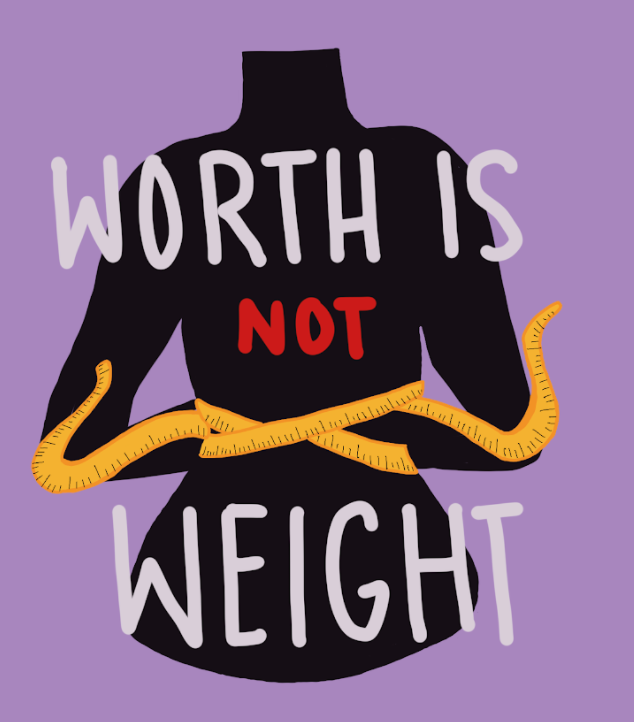Helping to Identify Eating Disorders
A photo that captures everything a person should know. Your weight does not define your worth.
Oct 1, 2021
Trigger Warning.
Adolescents between the ages of 12-25 may struggle with an eating disorder or are at high risk of developing one. Eating disorders can come in many forms including Anorexia Nervosa, Binge eating disorder, Other specified Feeding and Eating disorder (OSFED), Avoidant restrictive food intake disorder (ARFID), and Unspecified food eating disorder (UFED). The two main eating disorders are known as Anorexia Nervosa (Anorexia) and Bulimia Nervosa (Bulimia). Ms. Wagner a counselor here at GEHS deals with mental health issues including disordered eating and eating disorders.
“It’s a mental health concern so I have specific training related to eating disorders and I know the social workers do as well, both Elise Dickerson and Emily Horner,” Ms. Wagner said.
Anorexia Nervosa is an emotional disorder in which someone has an obsessive desire to lose weight by refusing to eat. Anorexia is life-threatening and affects physical and mental health. It is common in teenagers both male and female. However, the causes of Anorexia vary. Dieting is the primary risk and the trigger for most Anorexia cases, However changes in life circumstances, a traumatic experience, and bullying/abuse are other causes of an eating disorder. Media pages and feelings of jealousy along with low confidence also promote eating disorders at a young age. Anorexia Nervosa has many physical, psychological, and behavioral symptoms.
Physical symptoms of Anorexia are weight loss in an unhealthy amount of time, heart problems, kidney failure, fine hair, teeth decay and so much more. Some physiological symptoms are an intense fear of weight gain, obsessive rules about dieting, weight, and body shape, depression and anxiety, and expressions of low worth. Behavioral symptoms such as, binge eating, hiding food, obsessive rituals around food, body checking, and misuse of laxatives and other medications are signs of anorexia.
Bulimia Nervosa is an eating disorder in which a person eats large amounts of food in a short period of time, also known as binge eating. People struggling with bulimia feel they do not have the willpower to stop themselves from binge eating and feel they have no control over their consumption of food. To compensate for this overconsumption of food, people with Bulimia will vomit, fast, use diuretics/laxatives, and over-exercise. There are many physical, psychological, and behavioral signs to look for in people struggling with Bulimia.
Frequent changes in body weight, damaged teeth and bad breath from vomiting, dizziness, and fatigue, and loss of menstrual cycle in women are all physical symptoms of Bulimia. Similar to the symptoms of Anorexia, obsession with eating, dieting, and exercising, shame, guilt and disgust after consuming food, and depression/low-self esteem are all psychological symptoms of Bulimia. Behavioral symptoms of bulimia include the disappearance of food, secretive behavior around food, eating alone, frequent trips to the bathroom after eating, and much more.
It is important for adolescents to be educated about the extremity of eating disorders.
“I think that even if somebody doesn’t qualify to have an eating disorder I think a lot of people experience disordered eating. Meaning eating in a way that does not actually fuel your body or eating with some sort of obsession related to the quality of the food and calories of the food or any type of body dysmorphia is common and becoming more common” Ms. Wagner said.
For example, you’re good friends with 15-year old-boy “X” who is noticeably avoiding food. You don’t think anything of it until he tells you he feels dizzy. You ask X if he would like something to eat but he still refuses. School ends and the next week, X looks noticeably slimmer. You ask him if he has been working at the gym and he tells you his secret; “I don’t work out, I just avoid food all day. I try to survive the day on some water and an apple and it seems to be working out,” X said.
You are surprised and you know this is not a healthy way to lose weight or achieve your ideal body image. You believe X might have an eating disorder and you’re not sure how to report it.
If someone close to you is struggling with an eating disorder, “You would want to refer them to any mental health professional or a physician” Ms. Wagner said.
Any of the counselors here at GEHS are qualified to help with eating disorders and disordered eating.
A helpline you can access if you are struggling with a disaster or crisis is: 1-800-931-2337






